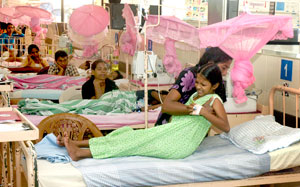As the spectre of a dengue epidemic loomed large, the Sri Lanka College of Paediatricians warned parents and doctors not to give children common pain-relieving medication.
The Health Ministry’s Epidemiology Unit reported that within the first 13 days of this year, there were as many as 674 dengue patients hospitalised with five deaths across the country. In this backdrop, the Sri Lanka College of Paediatricians has identified certain medications as being harmful and leading to bleeding in children.
 |
| The overcrowded children’s ward at Colombo South hospital. Pic Saman Kariyawasam |
Non-steroidal anti-inflammatory drugs (NSAIDs) such as aspirin, ibuprofen, mefenamic acid and diclofenac sodium suppositories should not be given to children with fever prior
to admission to hospital, urged Prof.
Asvini Fernando, President of the Sri Lanka College of Paediatricians, pointing out that it is advisable to use only paracetamol at the recommended doses to bring down the fever, along with sponging the child with lukewarm water.
In a formal message to all parents, the College of Paediatricians said, “it is well documented that children who have had these medicines have a greater potential to bleed when they have Dengue Haemorrhagic Fever (DHF)” and advised parents to refrain from giving their children these medications if they have fever.
Explaining that paediatric wards in most parts of the country are dealing with a large number of children with Dengue Fever (DF) and Dengue Haemorrhagic Fever (DHF), Prof. Fernando said it had been noted that some of these children had received these medications before admission to hospital.
These drugs (NSAIDs) are available in the market under different trade names. Hence it is important to check the labels of all medications available for control of fever, prior to giving them to your child, she said.
Echoing the views of the paediatricians, an Epidemiology Unit official said parents should not panic and dose the child with these common pain-relieving drugs. “It is essential to rule out dengue whenever a child has fever,” the official said, explaining that the fever is only a symptom of the disease. Referring to the harmful effects of giving pain-relieving drugs if the child is having dengue, the official said such drugs might erode the lining of the stomach.
By nature, these medications also have anti-clotting properties. As such NSAIDs in any form, be it tablets, liquids, suppositories or injections, should not be given for fever as dengue is raising its head once again, the official said.
Meanwhile, senior Consultant-Paediatrician, Dr. LakKumar Fernando who is also a dengue specialist said that looking at the trend last year, usually among those affected by dengue about 50% would be children. Last year, among the dengue deaths, one-third comprised children and two-third adults.
Adding his voice to the serious concerns expressed over the use of NSAIDs when dengue is rampant, he pointed out that the guidelines for dengue management formally introduced by the Health Ministry in December 2010 specifically advised against their use. If any child has fever, the first assumption should be that it is dengue, as this viral disease is now hyper-endemic in Sri Lanka, he says.
A few years ago if we saw 10 children with fever, about 2-3 would be dengue patients. But now in Colombo, of 10 children with fever, we should suspect that five have dengue, while in Negombo it would be as high as eight, said Dr. Fernando who is based in Negombo.
Being part of a team which has studied dengue management not only in Thailand but also helped implement such measures in Pakistan recently, he said that when called upon to advise paediatricians all over the country on managing very ill children he had come across many who had bled due to being given either ibuprofen or mefenamic acid before admission to hospital. “When dengue is around us, don’t give NSAIDs to bring down the fever,” he said, even though fever could be a distressing symptom and parents may look for quick relief. For, NSAIDs would then do more harm than good.
Explaining that dengue patients die due to prolonged shock, fluid overload or massive bleeding, Dr. Fernando added the cause of death in a large proportion of patients was massive bleeding.
Currently while the Colombo and Gampaha districts of the Western Province are the worst-hit with dengue, increased numbers are also being recorded in Kandy, Puttalam, Batticaloa, Kurunegala and Galle, the Sunday Times learns.
Last week, the Sunday Times reported (city edition) that Negombo was in the throes of a dengue epidemic with at least 75 patients, both children and adults, being treated at the Negombo Hospital on any given day. |


